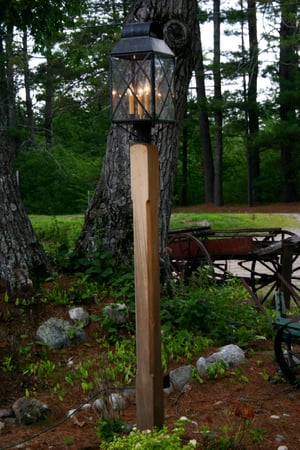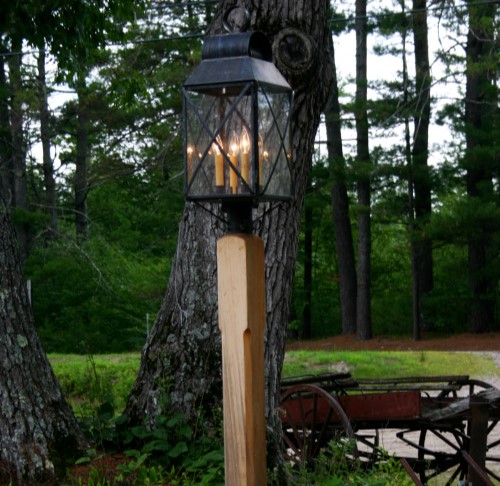How to Choose the Right Lamppost Material
Comparing the Benefits of Cedar, Granite, and Vinyl
When it comes to outdoor lighting, lampposts enhance both functionality—by providing vital illumination—as well as your property’s aesthetics by contributing to overall ambiance and curb appeal. However, selecting the right lamppost material can be a crucial decision. This blog explores the key features to bear in mind, and how the three most popular lamppost materials match up.
 1. Durability
1. Durability
Because lampposts are exposed to a variety of environmental elements—including sunlight, rain, snow, and wind—durability is a key consideration when choosing a material.
- Cedar lampposts have a long lifespan, often lasting several decades with proper care. Cedar’s natural resistance to decay and insects means less worry about costly repairs or replacements due to wood damage. The cedar’s oils and tannins provide a degree of protection against harmful environmental factors, such as UV rays and moisture.
- Granite is a natural stone known for its ability to withstand harsh weather conditions. Compared to other materials, it is less prone to chipping, cracking, or fading.
- Vinyl is also a popular material for lampposts, and it is known for its durability. Vinyl lampposts are resistant to rust, corrosion, rot, and insect damage, making them suitable for outdoor use in various weather conditions; they can withstand exposure to environmental elements without deteriorating.
2. Maintenance
Opting for a low-maintenance material can save time and effort in the long term.
- Cedar lampposts require minimal care to keep their natural beauty. A simple cleaning and occasional sealing or staining can extend the life of a cedar lamppost and maintain its appearance, though the weathering effect on cedar is a characteristic that is valued in the Northeast.
- Granite is easy to clean, and sealing it periodically can help protect it from stains and moisture penetration.
- Vinyl lampposts require minimal maintenance, compared to other materials such as wood. They do not need to be painted, stained, or sealed regularly. Cleaning with soap and water occasionally is usually sufficient to keep them looking new.
3. Visual Appeal
Each lamppost material has unique aesthetic qualities that can complement different architectural styles and landscaping designs.
- Cedar lampposts provide a natural, rustic quality.
- Granite lampposts offer a traditional, substantial ambiance.
- Vinyl lampposts have a clean appearance and come in various styles and designs. They can also be made to resemble wood or granite.
Unique light fixtures, ornamental details, and natural finishes are optional touches that can add charm and character, boosting the visual appeal of any lamppost.
4. Cost
Budget considerations play an important role in the decision-making process. It’s essential to weigh the initial investment against long-term costs to determine the most cost-effective option for your needs.
- Granite may have a higher upfront cost, but offers better long-term value due to its durability and low-maintenance requirements.
- Vinyl lampposts are generally more affordable than lampposts made of granite. While the cost of vinyl may be slightly higher than wood, the savings in maintenance expenses over time make vinyl a cost-effective option in the long run.
- Cedar generally has a lower initial cost than granite or vinyl, and with minimal maintenance can last decades, providing an excellent return on investment.
5. Environmental Impact
Sustainable materials are becoming increasingly popular for environmentally conscious consumers. Consider the environmental impact when choosing a lamppost material, including its production process, lifespan, and recyclability.
- Granite is a natural material that is abundant in the earth’s crust, making it a sustainable choice for outdoor applications. It is also recyclable and can be repurposed at the end of its lifespan, reducing its environmental impact.
- Vinyl lampposts can have a mixed environmental impact. While they are not biodegradable, they are recyclable. However, the manufacturing process of vinyl may involve the use of chemicals and energy, which can have environmental implications. It’s essential to consider the overall lifecycle impact when evaluating the environmental friendliness of vinyl lampposts.
- Cedar is a renewable and sustainable resource when harvested responsibly. Customers who prioritize eco-friendliness find cedar a compelling choice.
Selecting energy-efficient lighting fixtures, such as LED bulbs, can further reduce environmental impact by lowering energy consumption and carbon emissions.
6. Local Regulations and Conditions
Before choosing a lamppost material, familiarize yourself with local regulations, codes, and climate conditions that may affect your choice. Certain areas may have specific requirements or restrictions regarding lamppost materials for safety and aesthetic reasons. You should also consider environmental factors, such as wind load, seismic activity, and exposure to saltwater or harsh weather conditions, which may influence the durability and suitability of different materials.
7. Compatibility with Lighting Fixtures
Ensure that the chosen lamppost material is compatible with the lighting fixtures you intend to use. Different materials may have varying mounting options, load capacities, and wiring configurations. It’s critical to select a material that can accommodate the specific requirements of your lighting set-up to ensure proper installation and functionality.
Choosing the right lamppost material involves careful consideration of factors, such as durability, maintenance, visual appeal, cost, environmental impact, local regulations, and compatibility with lighting fixtures. By evaluating these aspects and prioritizing your needs and preferences, you can select a material that meets your practical requirements while also enhancing the beauty and functionality of your outdoor space for years to come. Whether you opt for the natural beauty of granite, the practicality of vinyl, or the rustic charm of cedar, the perfect lamppost material is available to illuminate your outdoor environment in style.
AVO Fence & Supply is the leading supplier of cedar lampposts in New England with locations in Stoughton, Plymouth, and Hingham, MA. Learn about the wide variety of lampposts we offer in cedar, vinyl, and granite by calling us today at (781) 341-2963.

